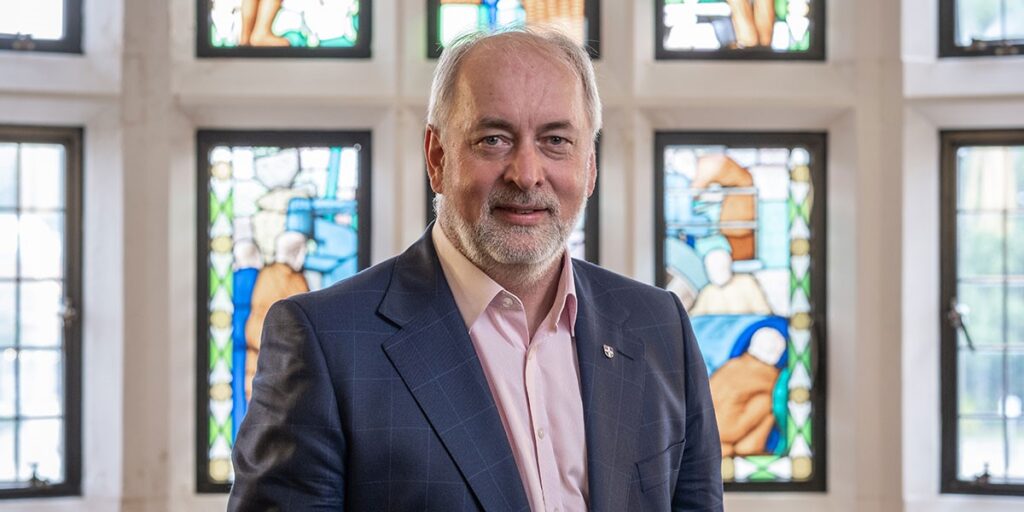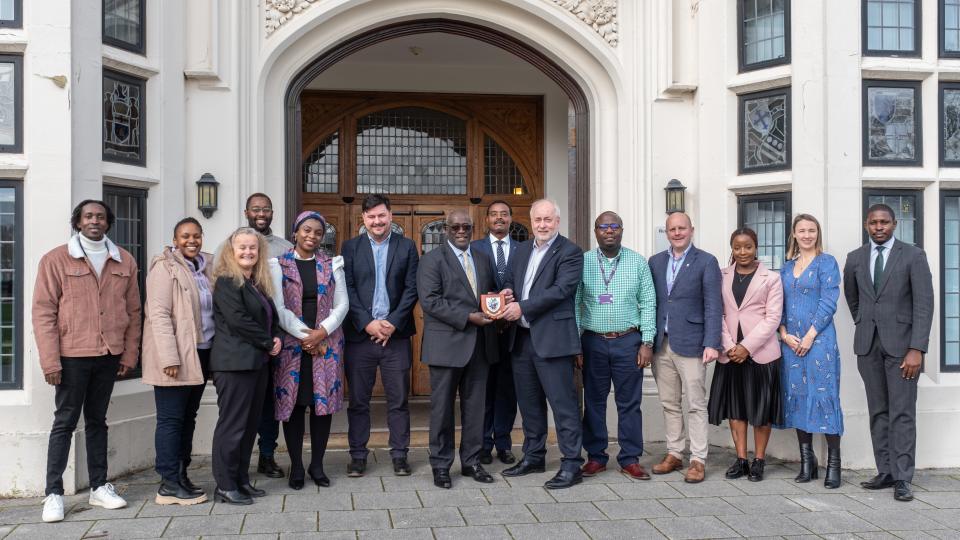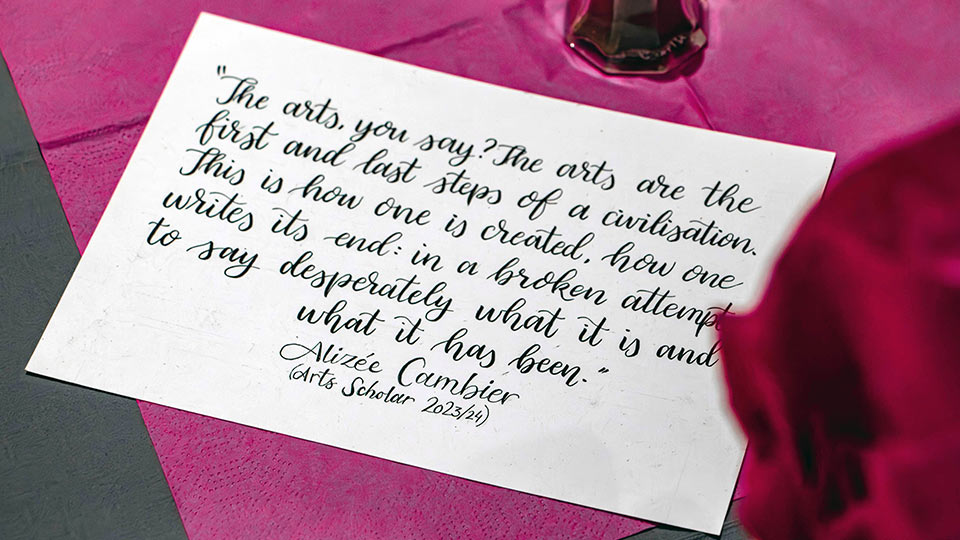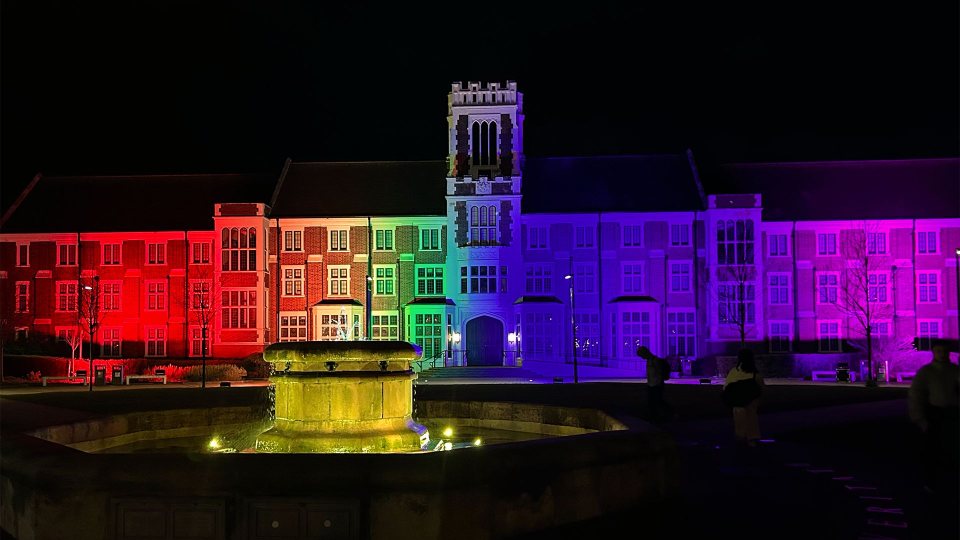From the Vice-Chancellor – February 2024

In my newsletter this month: High profile visitors on campus, new international postgraduate scholarships, the new Culture and Creativity strategy, LGBT+ History Month, and an exciting brand campaign set to be launched.

University welcomes influential visitors
The University has welcomed a number of high profile and influential visitors this month.
Staff, students, alumni and guests from regional and national businesses gathered at Loughborough Business School (LB) to hear the Bank of England Governor, Andrew Bailey, give an overview of the state of the banking sector as part of LB’s Distinguished Speaker series. Mr Bailey’s lecture focused on the future issues that are important for banks and for broader monetary and financial stability.
Professor Lucy Chappell, Chief Scientific Adviser for the UK Department of Health and Social Care, visited the University’s Centre for Lifestyle Medicine and Behaviour (CLiMB) and the Peter Harrison Centre for Disability Sport (PHC), before joining colleagues at the National Rehabilitation Centre (NRC) currently being developed at Stanford on Soar, on the outskirts of Loughborough. Through their pioneering research, the three centres will, or already do, impact positively on the people’s health and wellbeing.
Andrew Griffiths MP, Minister of State for Science, Research and Innovation, was joined by Loughborough MP Jane Hunt on a visit to the National Centre for Combustion and Aerothermal Technology (NCCAT), where they learned about the Centre’s work, including the Rolls-Royce-led project with easyJet to develop hydrogen combustion engine technology capable of powering a range of aircraft. The Minister also heard about our ambitions for The Hydrogen Works – a Loughborough-led strategic partnership to create a hydrogen superpower in the East Midlands to help address the challenges to deliver energy security, net zero and reduce Britain’s productivity gap.
Then last week a group of students from Kenya, senior colleagues and I welcomed His Excellency Ambassador Manoah Esipisu, the High Commissioner of Kenya, to the University. We discussed current research linked to the region, such as sustainable energy solutions, child nutrition and social development, as well as future opportunities. Dr Sola Afolabi and Dr Hibbah Osei-Kwasi, our International Special Envoys for Sub-Saharan Africa, presented our plans for building further partnerships in Kenya and the East Africa region.
Visits and events such as these are important contributions to our strategic aims and themes. They expand our network of influential contacts, allow us to showcase the University to people who can have a positive impact on what we do, and grow the number of individuals that can speak positively about and with knowledge of Loughborough.
New international scholarships announced
This month we announced a new scholarship package to support international students who are looking to study for a master’s degree. The Global Impact Scholarships have been developed to enable bright students from the Least Developed Countries to study at Loughborough by removing financial barriers that might prevent them from applying. We want to attract high calibre graduates with the ability and commitment to lead and drive sustainable change within their communities following their studies.
When looking to study abroad, students can often be deterred by the costs involved. By providing the funding to cover the majority, if not all of their tuition fees, those who receive one of our Global Impact Scholarships will be able to fully immerse themselves in the experience we offer here at Loughborough, without worrying about financial pressures.
The provision of scholarships such as these support several objectives within our International Engagement and Impact core plan; they enhance our global reputation and profile and, as a consequence, enable us to diversify our international student population and foster an inclusive community.

Culture and Creativity Strategy launched
Culture and creativity are part of all our lives. They enrich our understanding and appreciation of the world, introduce us to new ideas and new ways of living, and support our mental health and wellbeing.
They are also essential components of the experience we offer to both our students and staff. This month we launched the University’s Culture and Creativity strategy. Through its seven goals it will support the delivery of many of our wider University strategic aims. For example, it will nurture our students’ creativity as part of their University experience to enhance their learning and skill development and add value to their future employability; it will amplify our research through public engagement and enable us to forge new partnerships; and it will enable us to celebrate the diversity of our community.
We know that a significant proportion of our staff and students regularly engage with the cultural activities on offer at the University through LU Arts, from NT Live screenings and music tuition to pottery and creative writing evening classes. These activities are important to personal development and wellbeing, and the new Strategy will enable us to enhance our cultural opportunities still further.

LGBT+ History Month marked at the University
Each year our LGBT+ Staff Network and Students’ Union Association work incredibly hard with colleagues across the University to put together an outstanding programme of activities to mark LGBT+ History Month – and the events throughout February were as poignant, thought-provoking and engaging as ever.
The theme for this year’s History Month was Medicine, focusing on the contributions of LGBT+ people to healthcare and the health inequalities still faced by the community today.
At the keynote event, Jacob Stokoe shared his experiences as a pregnant trans person and the hurdles he faced in accessing maternity services. Jacob was joined by Loughborough alumna Lisa Vine, a former Chair of the Students’ Union LGBT+ Association and now an award-winning LGBT+ advocate, and Katie Neeves, a photographer and TV presenter who describes herself as a woman on a mission, to show that it’s not only OK but actually cool to be trans.
We had a display in the library of articles and research from our archives, showcasing LGBT+ experiences of, and contribution to, medicine through the years. Our Academics’ and Doctoral Researchers’ work covers a wide variety of issues: from pregnancy loss in lesbian and bisexual women, to dementia support for caregivers in the LGBT community.
And throughout the month the Hazlerigg Building was illuminated with the colours of the rainbow.
LGBT+ History Month enables us to mark achievements, successes and progress, but it also allows us to reflect on the prejudice, discrimination, intolerance and abuse still faced by the community today.
Sometimes in this area we have to have difficult conversations about issues that generate real depth of feeling. There are often differing and incompatible views. One such example is that the University is currently exploring partnership options in Saudi Arabia. I believe that we should discuss the associated issues openly and honestly as a community. I recognise that participating in these discussions takes courage and my colleagues and I are always grateful for the open and authentic way in which such engagement occurs.
Exciting brand campaign to be launched
Next month we will begin to roll out a major brand campaign that aims to raise the University’s global profile. Through advertising, digital content and media coverage, for instance, we’ll target a range of audiences, including academics, employers, policymakers and prospective postgraduate students, to encourage them to study, partner or work with us.
The campaign is a significant initiative under Project Reputation, one of the six enabling projects that have been established to consider the operational changes that are needed to ensure we are well placed to progress our strategic aims.
The campaign will include an advertisement in the Times Higher Education early next month. I won’t reveal the concept just yet, but I think it’s really exciting and will help us to position ourselves as a bold, ambitious university that seeks to make change for a better world.
Vice-Chancellor's Communications
Opinions and comment from the Vice-Chancellor, Professor Nick Jennings

